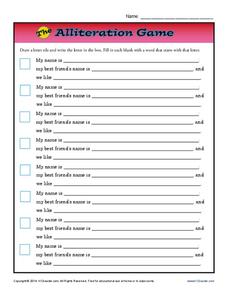K12 Reader
Change the Point of View: Third Person to First Person
Use Jack London's The Call of the Wild to help young writers learn the difference between first and third person points of view. After they read a passage from the novel, they rewrite it in the first person point of view.
K12 Reader
Narrator and Point of View
Point of view is important when choosing a narrator. Help young writers distinguish between first and third person point of view with an activity that features excerpts from Robert Louis Stevenson's Treasure Island. After reading four...
K12 Reader
Change the Point of View: First Person and Third Person
How is a story different when told from various points of view? Learn about first and third person points of view with an activity based on Robert Louis Stevenson's Treasure Island. Readers examine a passage written in first person, then...
K12 Reader
Context Clues: The Meaning Is There!
Learning how to use context clues is helpful for both reading comprehension skills and to determine the meaning of unfamiliar vocabulary words. As they read ten sentences with underlined words, learners choose the most...
K12 Reader
Adding Alliteration to Poetry
Alliteration can make the language of a poem flow. Add adjectives to several blanks in two poems to form alliterative phrases.
K12 Reader
Alliteration and Tongue Twisters
Did she sell seashells by the seashore, or did Bill buy berries by the ballpark? Practice literary skills with an activity based on famous tongue twisters. Kids replace the nouns, verb, and adjectives in two phrases to create a new...
K12 Reader
Alliteration: It’s a Zany Zoo!
Elephants eat and cheetahs chase in this zany zoo! Kids survey a list of ten animals before adding in an adjective and verb for each to form an alliterative phrase or sentence.
K12 Reader
Warm Up to Alliteration!
How can you tell if a sentence has alliteration? Use a short worksheet to help kids identify examples of alliteration, complete sentences to create alliteration, and use nouns to write their own alliterative sentences.
K12 Reader
Adventures with Alliteration! - Nouns
Create poetry with a worksheet based on alliterative phrases. After reviewing ten nouns, kids add an adjective to each based on the first letter of the noun. They then rewrite five sentences to involve more alliteration.
K12 Reader
Alliteration Animals
Bees buzz, dogs dig, lion laze, and snakes slither! Use alliteration to create sentences about four different animals.
K12 Reader
Alliteration Game
Practice alliteration with a fun game! Kids match names to a best friend's name, and add something they both like.
K12 Reader
Adventures with Alliteration! - Verbs
Work with wonderful words within a well-written worksheet! Kids match alliterative verbs to fifteen names in order to get alliterative phrases.
K12 Reader
Adventures with Alliteration! - Adjectives
Have hearty humor with a handy, helpful handout! Kids work on their alliteration skills with a figurative language worksheet that focuses on alliterative adjectives and phrases. After kids add nouns to ten adjectives, they create five...
K12 Reader
Figurative Language: Edgar Allan Poe’s “The Bells”
Bells, bells, bells abound in a worksheet designed for Edgar Allan Poe's famous poem "The Bells." Middle schoolers are asked to identify the various poetic devices Poe employs.
K12 Reader
Proverbs and Adages: What’s the Meaning?
Your kids have probably heard these idioms before, but do they know what they mean? Help them learn that haste makes waste, an ill wind blows no good, and that ignorance is bliss with a list of popular expressions.
K12 Reader
Proverbs and Adages: What Do They Mean?
You shouldn't judge a book by its cover, but feel free to find the silver lining in a activity about common proverbs and adages. Learners read six popular adages and write their literal definitions on the lines provided.
K12 Reader
Finish the Proverbs and Adages
How many common idioms do you know? Test your knowledge with a set of ten phrases to complete. The idioms range in difficulty level, making it a good challenge for even advanced readers.
K12 Reader
Animal Proverbs and Adages
What will play when the cat's away? Practice figurative language with a list of proverbs about animals. Kids use the word bank at the top of the page to fill in the blanks based on their knowledge of common phrases.
K12 Reader
Proverbs and Adages Match
The grass may be greener on the other side, but a worksheet about proverbs and adages is sure to help readers of all levels master figurative language. Kids match the idioms in the first column to their literal meanings in the second...
K12 Reader
What Can You Infer?
Perhaps one of the most famous and illustrative stories featuring irony, "The Gift of the Magi" by O. Henry provides many opportunities for learners to make inferences about its characters. After reading a short introductory passage from...
K12 Reader
Using Inference in Writing
What could have happened to a plane buried in snow? Have kids practice making inferences with a writing prompt for which they describe a photo without using specific key words.
K12 Reader
Inference Practice 2: Where Am I?
Practice using context clues with a activity about making inferences. Five prompts encourage kids to interpret where each event takes place based on the details in each passage.
K12 Reader
Inference in Literature: The Wizard of Oz
We're off to see the wizard! Practice making inferences in literature with two sample paragraphs from L. Frank Baum's The Wonderful Wizard of Oz. Each passage provides questions about the pleasantness of the place it describes, and kids...
K12 Reader
Inference Practice: Who Am I?
Have a little fun teaching your class about inferences with this short and simple guess who exercise. Provided with five short passages describing different types of people, young learners must read each one and use the included details...

























